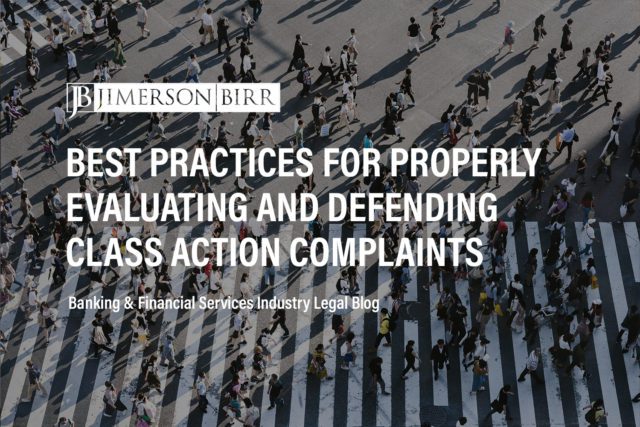What does FCRA class action defense litigation entail?
FCRA class action defense represents the legal strategies and arguments employed by defendants (usually credit reporting agencies, furnishers of information, or users of consumer reports) to challenge claims that they have violated the Fair Credit Reporting Act (FCRA) on a class-wide basis.
In such cases, a group of plaintiffs asserts that a defendant’s actions or inactions have affected them similarly, thus seeking remedies collectively. Defending against FCRA class actions requires a thorough grasp of the FCRA’s requirements and the nuances of class action litigation under Florida and federal law.
For instance, under federal law, a defendant may argue that a class is insufficiently “ascertainable” because the plaintiffs have not shown that class members can be readily identified through objective criteria. This argument was exemplified in Byrd v. Aaron’s Inc., 784 F.3d 154 (3d Cir. 2015), where the court denied class certification based on the plaintiffs’ inability to establish an ascertainable class.
Another example under Florida law involves contesting the adequacy of the plaintiffs’ representation. In Sosa v. Safeway Premium Finance Co., 73 So. 3d 91 (Fla. 2011), the Florida Supreme Court held that a class could not be certified because the named plaintiff’s interests were not sufficiently aligned with those of the proposed class members.
To successfully defend against FCRA class actions, a comprehensive understanding of the applicable federal and state laws and the ability to identify and assert persuasive legal arguments is crucial.
Need help regarding FCRA defense litigation? Schedule your consultation today with a top FCRA defense litigation attorney.
Which laws and regulations apply to FCRA class action defense litigation in Florida?
Florida and federal laws coalesce to govern FCRA class action defense litigation. At the federal level, the Fair Credit Reporting Act (15 USC § 1681 et seq.) outlines the rights of consumers and the responsibilities of entities handling consumer reports. Additionally, the Class Action Fairness Act (28 USC § 1332(d)) and Rule 23 of the Federal Rules of Civil Procedure govern class action requirements and procedures in federal courts.
In Florida, the Florida Consumer Collection Practices Act (FCCPA) (Fla. Stat. § 559.55 et seq.) often intersects with the FCRA, as it regulates the collection and dissemination of consumer information. While the FCCPA is a state law, it frequently operates with the FCRA in class action cases. Florida’s class action rules are within Rule 1.220 of the Florida Rules of Civil Procedure, which defines the criteria for certifying a class and the process for pursuing a class action lawsuit.
As such, defendants must navigate federal and state laws in FCRA class action defense litigation.
What are common issues regarding the FCRA that lead to class action litigation?
The following issues commonly lead to FCRA litigation:
- Inaccurate information on credit reports: Consumers may file a class action lawsuit if credit reporting agencies (CRAs) fail to maintain accurate information, causing harm to a large group of individuals.
- Failure to investigate disputes: The FCRA requires CRAs to conduct a reasonable investigation when a consumer disputes information on their credit report. A class action lawsuit may arise if CRAs do not fulfill this obligation.
- Unauthorized access to credit reports: Consumers can seek relief through a class action if CRAs negligently or willfully allow unauthorized parties to access their credit reports.
- Improper use of consumer reports by furnishers: Companies that provide consumer information to CRAs, known as furnishers, can face class action litigation if they misuse consumer reports or fail to correct inaccurate information.
When a set of facts is appropriate for FCRA defense litigation, there are many paths a claimant may take. We are value-based attorneys at Jimerson Birr, which means we look at each action with our clients from the point of view of costs and benefits while reducing liability. Then, based on our client’s objectives, we chart a path to seek appropriate remedies.
To determine whether your unique situation may necessitate litigation, please contact our office to set up your initial consultation.
What FCRA class action claims do plaintiffs generally bring to court, and what are common legal defenses to those claims?
To file an FCRA class action lawsuit in Florida, plaintiffs must satisfy procedural and evidentiary requirements. These requirements include: demonstrating that the class is so numerous that individual suits would be impractical, determining whether common questions of law or fact exist, whether the representative parties’ claims are typical and whether the representative parties will fairly and adequately protect the class interests.
Common claims that FCRA class action plaintiffs file in Florida courts include:
- Negligent violation of the FCRA
- Willful violation of the FCRA
- Inaccurate credit reporting
- Failure to follow reasonable procedures to ensure the accuracy of reported information
Common legal defenses that FCRA class action defendants raise against FCRA class action complaints include:
- Statute of limitations: Defendants may argue that the plaintiff’s claim is time-barred if not filed within the FCRA’s two-year statute of limitations.
- Lack of standing: Defendants can contend that the plaintiff lacks standing to sue if they have not suffered an injury in fact, such as actual financial harm.
- Compliance with the FCRA: Defendants may assert that they complied with the FCRA’s requirements, which can involve providing evidence of reasonable procedures to ensure accurate reporting.
- Lack of causation: Defendants can argue that the defendant’s actions or omissions did not directly cause any alleged harm suffered by the plaintiff.
Please contact our office to set up your initial consultation to see what actions or defenses may be available for your unique situation.
What are effective measures to minimize the risk of class action litigation?
The following measures can help mitigate the risk of FCRA class action litigation:
- Implementing strict policies: Develop and enforce policies for accurately collecting, storing, and sharing consumer credit information.
- Regularly auditing and updating: Conduct periodic audits of internal processes and consumer reports to ensure compliance with the FCRA.
- Training employees: Educate employees on FCRA requirements and the importance of adhering to the company’s policies and procedures.
- Promptly addressing disputes: Respond to consumer disputes promptly and thoroughly, conducting reasonable investigations and correcting any inaccuracies.
- Seeking legal counsel: Consult with an experienced FCRA attorney to ensure continuous compliance with all applicable laws and receive guidance on best practices.
Frequently Asked Questions
- What damages can plaintiffs recover in an FCRA class action lawsuit?
Plaintiffs may be awarded actual damages, statutory damages (ranging from $100 to $1,000 per violation), and punitive damages in cases of willful noncompliance. Additionally, plaintiffs can recover attorney’s fees and court costs.
- How does the FCRA impact employers when conducting background checks?
Employers must comply with the FCRA when using consumer reports for employment purposes. For example, they must obtain written consent from the applicant or employee, provide notice of the intent to obtain a consumer report, and follow specific procedures if adverse action is taken based on the report.
- Can a consumer sue a furnisher of information under the FCRA?
Yes, consumers can sue furnishers of information for FCRA violations, such as providing inaccurate information to credit reporting agencies or failing to investigate disputes properly. However, the consumer must first file a dispute with the credit reporting agency and allow the furnisher an opportunity to correct the error.
Have more questions about an FCRA defense-related situation?
Crucially, this overview of FCRA class action defense does not begin to cover all the laws implicated by this issue or the factors that may compel the application of such laws. Every case is unique, and the laws can produce different outcomes depending on the individual circumstances.
Jimerson Birr attorneys guide our clients to help make informed decisions while ensuring their rights are respected and protected. Our lawyers are highly trained and experienced in the nuances of the law, so they can accurately interpret statutes and case law and holistically prepare individuals or companies for their legal endeavors. Through this intense personal investment and advocacy, our lawyers will help resolve the issue’s complicated legal problems efficiently and effectively.
Having a Jimerson Birr attorney on your side means securing a team of seasoned, multi-dimensional, cross-functional legal professionals. Whether it is a transaction, an operational issue, a regulatory challenge, or a contested legal predicament that may require court intervention, we remain tireless advocates at every step. Being a value-added law firm means putting the client at the forefront of everything we do. We use our experience to help our clients navigate even the most complex problems and come out the other side triumphant.
If you want to understand your case, the merits of your claim or defense, potential monetary awards, or the amount of exposure you face, you should speak with a qualified Jimerson Birr lawyer. Our experienced team of attorneys is here to help. Call Jimerson Birr at (904) 389-0050 or use the contact form to schedule a consultation.


We live by our 7 Superior Service Commitments
- Conferring Client-Defined Value
- Efficient and Cost-Effective
- Accessibility
- Delivering an Experience While Delivering Results
- Meaningful and Enduring Partnership
- Exceptional Communication Based Upon Listening
- Accountability to Goals











